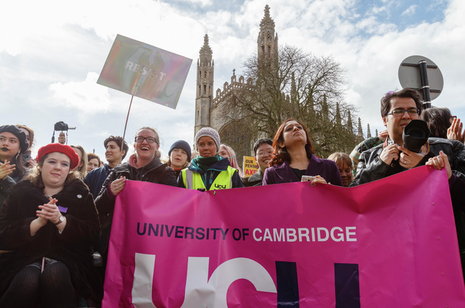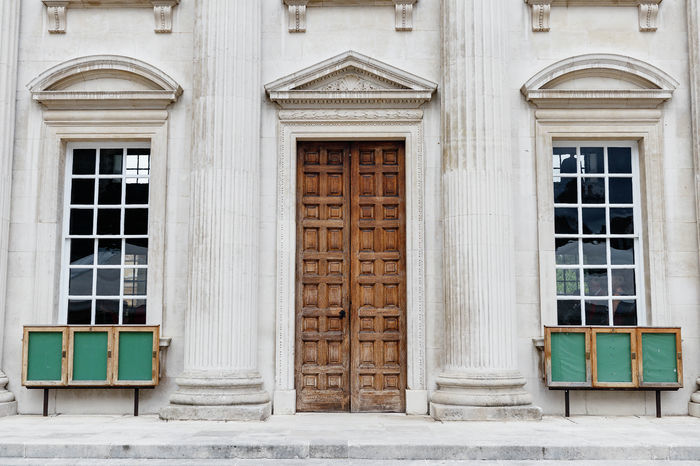We won’t be graduating unless vice-chancellors stop holding our education hostage
Cambridge has the power to help bring the dispute to an end. They should use it

Finalists are exhausted. Our exams are this week, but instead of revising some of us have found ourselves frantically telling people to sign an open letter. Sounds silly, and maybe it is. The message from the vice-chancellor this week has left us no choice. For finalists and MPhil students, the threat of not graduating on time holds very real repercussions, whether people are progressing into further study or entering the workforce. There is a palpable and justified anxiety amongst our cohort. For international students, changes in deadlines or delays in graduations associated with industrial action threaten visa status and are exacerbated by the particularly exploitative effects of workforce casualisation on international students and academics.
The marking and assessment boycott (MAB) is obviously only the latest round of industrial action from the Universities and Colleges Union (UCU) in trying to resist these trends and protect staff’s working conditions. All bar one of Lucy’s six terms in Cambridge has featured some kind of strike action. As a NatSci especially, this translates to a lot of contact hours missed. What strikes us most, however, is the University management’s refusal to actually address the issues over which staff are striking. The continuation and escalation of strike tactics is a proportional response to management’s stubborn refusal to alleviate the damaging environment of precarity, overwork and hardship amongst staff which bleeds into the student experience. Staff working conditions are our learning conditions.
“Senior university management are keeping their membership of UCEA very quiet”
It’s unfair and hypocritical for university management to deflect student’s anger onto the members of staff who have been sacrificing pay and risking their livelihoods to fight for a better university system ever since some of us began as undergrads in 2017/18. We’ve all benefited from the excellent teaching provided by this university’s academic staff, so we resist the narrative that they are the ones placing our graduations at risk – we all know where that decision lies. The Universities and Colleges Employers’ Association (UCEA) is the association of employers which can address problems of pay, overwork and casualisation. There is no way to move out of the cycle of regular industrial action without significant movement from UCEA. It’s frustrating, then, that we find ourselves in conversations which blame UCU for this disruption.
Before you criticise UCU, there are three things we should mention. Firstly, most importantly, why the MAB is happening: a 25% real-terms pay cut since 2009, horrifyingly normalised gender and race pay gaps, unsustainable workloads and casualisation. Secondly, many of us won’t graduate unless UCU demands are met, whatever you think of them. Thirdly, UCEA, who have the power to let us graduate, is a cabal of institutions with an income of £44.6 billion, investments worth £19.6 billion, and an ever-decreasing financial commitment to staff.
The money’s there to settle the dispute. Russell Group universities rake in £2.2 billion in surplus income each year. Our university sits on a horde of wealth and land, yet barely any of it trickles down the people who actually constitute the university: students, staff, the community around us. Instead, university management is creating ‘Exam Emergency Task forces’, investing their time, like their peers on the board of UCEA, in finger-pointing, bureaucratic-stalling, and taking punitive action against striking staff. Only last year did the management bother to even recognise the Cambridge branch of the UCU, prioritising at every opportunity Cambridge’s (already huge) profits over the interests of both staff and students. And it will continue to do so unless we demand – and ensure – that UCEA settles the dispute.
Senior university management are keeping their membership of UCEA very quiet. The dispute with UCU is a national issue, yes, but Cambridge University wields extraordinary wealth and power. Its whole schtick is reputational strength, so it can’t shirk responsibility. With no Cambridge higher-up currently on the board, they have no excuse to join in with the boardroom tendency to close ranks. There’s nothing to lose, theoretically. But something – pride, status, salary – is getting in the way of them admitting anything beyond a ‘hope that universities and UCU will resume talks to bring the boycott to an end’, that is, their power to make the talks resume.
Which is why the slogan “settle the dispute, let us graduate” doesn’t just mean “we’re all facing shitty circumstances which can be resolved at the same time”, it means we’re victims of the same gatekept power. The vice-chancellor’s refusal to take a stand testifies to the fact that university managers don’t really stand to lose anything from higher education continuing as it is. It’s working fine for them. It’s not working at all for their overburdened, underpaid staff, or their exhausted students, who will crawl into the job market bracing themselves for lifelong graduate tax on top of the crushing cost of renting in an inequality-metropolis like Cambridge or London.
So we know that it might not be in vice-chancellors’ interest to settle the dispute. But it is in their power. And it’s in our power to fight like hell for something better. Which is exactly what the UCU are doing: demanding a resolution to this dispute which UCEA is perfectly capable of resolving. It’s what students did in 2020 when, attacked again, we forced the government to U-turn on classist A-Level gradings. It’s happening in universities across the country: staff and students standing together against management which is happy to watch our universities fall apart. We invite you to join us.
 News / University Council rescinds University Centre membership20 February 2026
News / University Council rescinds University Centre membership20 February 2026 News / Hundreds of Cambridge academics demand vote on fate of vet course20 February 2026
News / Hundreds of Cambridge academics demand vote on fate of vet course20 February 2026 News / Judge Business School advisor resigns over Epstein and Andrew links18 February 2026
News / Judge Business School advisor resigns over Epstein and Andrew links18 February 2026 News / Caius students fail to pass Pride flag proposal20 February 2026
News / Caius students fail to pass Pride flag proposal20 February 2026 News / Union cancels event with Sri Lankan politician after Tamil societies express ‘profound outrage’20 February 2026
News / Union cancels event with Sri Lankan politician after Tamil societies express ‘profound outrage’20 February 2026










